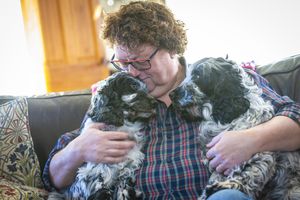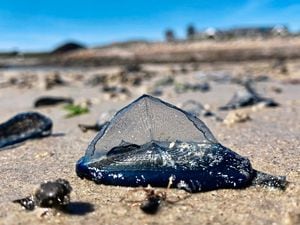‘My dog nearly died after eating palm oil’
A GUERNSEY dog owner is warning other pet owners to watch out for toxic substances on the beach after his dog nearly died after eating palm oil on L’Ancresse.

Craig Hughes was walking his two blue roan cocker spaniels on the last Sunday in January, when one of them ate a patch of oil on the sand.
‘Fred and Flossie were just racing around doing dog things, smelling seaweed and saying hello to other dogs and I didn’t pay much attention and didn’t see her eat it,’ he said.
‘Flossie’s the sort of dog that will eat a dead crab. She’ll eat anything, she’s that sort of dog.’
Palm oil is a colourless, odourless vegetable oil.
It is an extremely versatile ingredient used in processed foods, toiletries and is even commonly found in dog treats and supplements.
However, palm oil is often also used as a cleaning agent when cargo ships flush out their tanks.
International law permits ships to offload palm oil residue while still at sea, as long as they are at least 12 nautical miles from the nearest land and in water no less than 25 metres deep.
If the solidified oil is washed up it can prove irresistible to dogs.
Although Mr Hughes had no idea Flossie had ingested the palm oil, he began to suspect something was amiss when she took ill that evening.
‘She began to look a bit off colour that night and we woke up to a lot of vomit that had bean-sized globules of white fat in it.’
Mr Hughes took Flossie to the vet as she started to go downhill and she then spent five nights at the vets suffering from severe pancreatitis as her body reacted to the fatty substance.
The vet explained to Mr Hughes that the normal range for fat in a dogs blood is 0 to 200 milligrams per decilitre.
‘Flossie’s fat levels were over 2,000.
‘The machine only actually measures levels up to 2,000. She was literally off the scale.’
Flossie was finally released from the vets after her blood fat returned to close to 200, but left Mr Hughes with a bill of almost £2,600.
‘It’s not the money, they are like having children. This could have killed her.’
Flossie will be closely monitored for the next few weeks until her fat levels return to normal.
‘She is going to be off treats for quite a while,’ said Mr Hughes.
PALM oil washed up on beaches can make dogs very ill, according to the States Veterinary Officer David Chamberlain.
He said that although palm oil is commonly used in a number of food products, when it is found on beaches it can be contaminated with bacteria and toxins, and dog owners should contact their vet if their dog eats it.
‘If this is ingested by dogs it can cause extreme gastrointestinal upsets, resulting in vomiting and diarrhoea with associated dehydration,’ he said.
‘In the worst cases it can cause pancreatitis, which is often associated with abdominal pain, and which is manifested by the dog taking up a ‘prayer’ posture with their front legs on the ground and their rear end in the air. Pancreatitis can also cause serious electrolyte imbalances which can affect heart function.’
An Agriculture, Countryside and Land Management Services spokesman urged the public to be on the lookout for the substance and to keep pets away from it.
‘If any grey, cream or white fatty substances are found washed up on beaches, members of the public are advised not to remove the substance but to report it to ACLMS by emailing aclms@gov.gg or calling 01481 227000. If anyone has already picked up any substances of this description, please double-wrap it in plastic and dispose of it in your normal refuse.’





